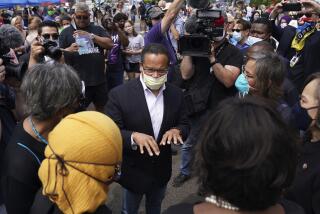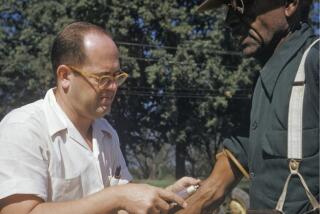Hiring Study Finds Strong Anti-Black Bias
- Share via
WASHINGTON — A groundbreaking study of workplace discrimination that sent “matched” pairs of white and black men to compete for the same jobs found that white applicants were three times as likely to receive a job offer and almost three times as likely to advance in the hiring process.
The Urban Institute study sent teams of black and white job-seekers with identical qualifications to apply for 476 jobs advertised in newspapers in Washington and Chicago. The results released Tuesday refute popular arguments that hiring decisions are colorblind or that blacks receive preferential workplace treatment, institute spokesmen said.
The study, which the institute said was the first of its kind, found that 15% of the white applicants received job offers, compared to only 5% of the blacks. Moreover, white men advanced in the hiring process 20% of the time, compared to only 7% for black men.
And, although the white men experienced rude or otherwise unfavorable treatment in 27% of their job searches, black applicants were treated unfavorably in 50% of their employment efforts.
The findings discredit arguments that affirmative action programs foster reverse discrimination by establishing job “quotas” for minority members and denying employment opportunities to more qualified white applicants, the co-authors of the report say.
They say also that their findings may bolster the case for passage of the Civil Rights Bill of 1991, which would make it easier for job applicants to prove workplace discrimination.
Employers “were caught in the act,” senior researcher Raymond Struyk said, noting the study’s descriptions of employers’ disproportionate preference for white men over equally qualified black men. “Their conscience ought to be piqued because we found that racial discrimination is occurring and it won’t go away.”
Struyk, along with fellow senior researchers and report co-authors Michael Fix and Margery Turner, concluded that, “despite extensive legislative and regulatory protections and incentives to hire minorities, unfavorable treatment of young black men is widespread and pervasive across firms offering entry-level jobs in the Washington, D.C., and Chicago metropolitan areas.”
The Civil Rights Bill of 1991 would restore worker protections eroded by a series of recent Supreme Court decisions. Last fall, President Bush vetoed a civil rights bill, complaining that the legislation would lead employers to hire according to race-specific quotas.
Opponents have been successful in thwarting civil rights activists by arguing that workplace discrimination no longer acts as a barrier to black advancement. They cite a wide range of attitudinal studies, including recent polls showing that large numbers of whites feel “disadvantaged” by affirmative action.
For example, the National Opinion Research Council at the University of Chicago found in a 1990 survey that 28.2% of the whites surveyed believed “it’s very likely” that “these days . . . a white person won’t get a job or promotion while an equally or less qualified black gets one instead.”
This attitude persists, said Tom Smith, senior director of the research council, even though few respondents relate firsthand knowledge of such preference.
The Urban Institute’s findings appear to debunk that belief. The study indicates that employment discrimination continues to cripple black male job-seekers, even when white and black applicants are of nearly identical age, experience, education, physique, language skills and other “human capital” characteristics.
Borrowing from methods often used in housing discrimination investigations, researchers instructed 10 pairs of “auditors”--male students from universities in the Chicago and Washington areas--to respond to entry-level job offers and to carefully document their job search experiences to institute researchers.
Other findings in the report include:
--Overall levels of discrimination differed between the two cities. Whites advanced further than blacks 23% of the time in Washington, compared to 17% of the time in Chicago.
In Chicago, blacks received a job offer 5% of the time, compared to 6% in Washington. Whites in Chicago got a job offer 10% of the time, and 19% of the time in Washington. Researchers said all of the jobs were in the private sector; they could offer no explanation for the disparity between the two cities.
--The likelihood of discrimination against blacks did not vary substantially between central city and suburban jobs.
--Black men were more likely to face resistence when applying for a service or sales job that involved public contact than when they applied for blue-collar positions such as stock clerk or loading dock positions. “In other words, discrimination against blacks appears to be highest in the types of jobs offering the highest wages and future income potential,” the study said.
More to Read
Inside the business of entertainment
The Wide Shot brings you news, analysis and insights on everything from streaming wars to production — and what it all means for the future.
You may occasionally receive promotional content from the Los Angeles Times.










